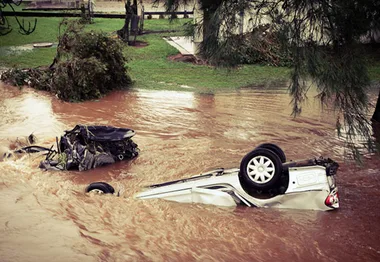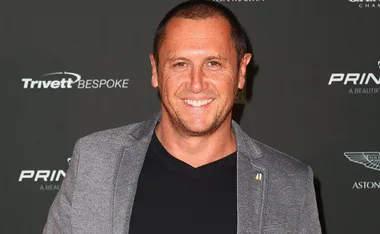Rhonda Hayes, 72, Coraki, NSW
I was sitting in the lounge with my Labrador, Toby, when there was an urgent rasp on the front door.
Who could that be? I wondered.
It was late, and there was a heavy downpour outside.
I opened the door to a man in an SES uniform.
“You need to evacuate!” he insisted. “The whole area’s flooding.”
It was February 2022, and many of the neighbouring towns had already been devastated by floodwaters, but because of our elevation, I thought Coraki would be okay.
The waters on our streets after they’d gone down a little
(Image: Supplied)I was wrong!
I was given 20 minutes to pack before Toby and I were driven to a nearby church being used as a refuge, where hundreds of other locals had gathered.
“Coraki’s surrounded by water,” one of the rescue volunteers informed me. “There’s no way in or out.”
My mind went to my son, Sunil, 42.
Following my cancer diagnosis, he’d moved in with me a few years earlier, as I could no longer walk without assistance.
Tragically, in late 2021, Sunil himself was diagnosed with an aggressive form of bone cancer.
He was now in hospital in Lismore, with only weeks to live.
I may never see him again, I feared.

I lost everything from the flood
(Image: Supplied)And the bad news didn’t stop there…
“Your dog has to go to a rescue centre,” another volunteer said.
Pets weren’t allowed in the temporary accommodation we were getting housed in.
Toby had been my best friend for 13 years, so saying goodbye to him broke my heart.
“Be good,” I told him in tears.
Agonisingly, the whole of Coraki had lost electricity.
The whole house was devastated
(Image: Supplied)With only one generator at the local public school, I had to wait until I could charge my phone before I heard from Sunil.
“We’ve lost the lot,” I cried to him.
After four days, the water had subsided enough for me to inspect my home.
Mud lined the walls where the water had risen to the ceiling and destroyed all my belongings.
It’s beyond repair, I lamented as I trudged through the mess.
My bathroom after the flood
(Image: Supplied)Fortunately, three days later, the roads out of Coraki had re-opened, and I could visit Sunil.
“You’ll get through this,” he said. “You’re strong.”
I stayed by Sunil’s side that whole week until he sadly breathed his last.
I’d lost my home, dog, and only child in two weeks, leaving my world in darkness.
A month later, I was sitting alone at the community hub when one of the volunteers, Lynne, approached me, accompanied by a young gentleman.

I was in a very dark place before I met Myles
(Image: Supplied)“This is Myles,” Lynne said. “He might be able to help you.”
Myles, 28, had been visiting family on the Gold Coast from Perth, where he lived, but was forced to stay due to COVID lockdowns.
“I’m a tradesman and was about to return home,” he explained. “But when the floods hit, I thought I’d stay and see if I could help anyone.”
Lynne had told him with no family around, I was in great need of support.
We drove to my house so he could take a look.
“You’ve got asbestos walls,” Myles told me. “It will be a big job, but I can do it.”

Myles refurbished my home for free
(Image: Supplied)He promised to do the work for free if I covered the cost of the materials.
It would cost me around $40,000, less than hiring a contractor.
“You’re my guardian angel!” I said, hugging him.
Soon after, Myles parked a caravan in my backyard, where he set to work.
In the meantime, I was moved to Rainforest Resort in Byron Bay, where the owner kindly allowed me to have Toby.
Slowly, light was coming back into my life.

I was so amazed at the job they did
(Image: Supplied)Each week, Myles would send me photos of his progress.
He cleaned up the mess and refurbished every room with his mate Shem and 40 volunteers from his church.
It’s a resurrection! I marvelled.
In July this year, after sixteen months, I finally came home.
The team had even installed a new kitchen and laundry, far nicer than I’d had before.

It’s even better than before!
(Image: Supplied)“I cannot thank you enough,” I beamed.
I see Myles regularly when he comes to do the finishing touches, and we’ve developed a great friendship.
“You’re like a son to me,” I told him one day.
He’s shown me that beautiful people can be found even in the darkest times.



